Edith Meller (1897-1953) was a Hungarian film actress, whose career was in the German silent cinema. She appeared in several films written, directed, and produced by Georg Jacoby, whose first wife she was for a short time.
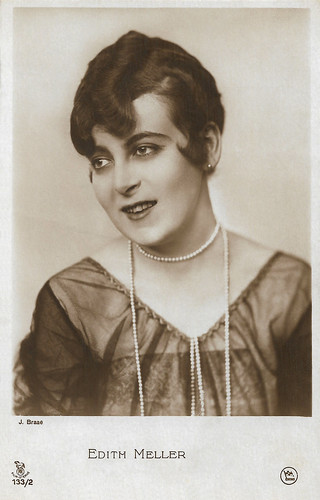
German postcard by Rotophot in the Film Sterne series, no. 133/2. Photo: J. Braae.
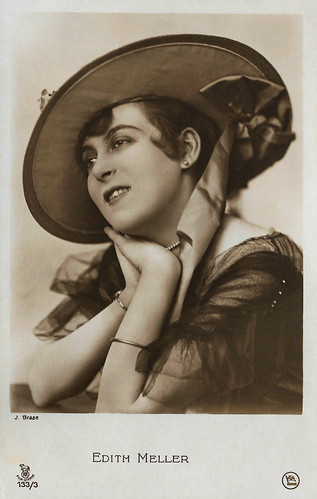
German postcard by Rotophot in the Film Sterne series, no. 133/3. Photo: J. Braae.
Edith Meller (also Mèller) was born in 1897 in Budapest, then one of the two capitals of the dual monarchy Austria-Hungary. She was the daughter of a mill owner and spent her childhood and youth in Pressbaum near Vienna.
She attended a Viennese theatre school and received her first engagement at the Theater an der Wien.
On the mediation of former Austro-Hungarian Foreign Minister Leopold Berchtold's wife, Meller could make her film debut in the pro-Bulgaria propaganda film Bogdan Stimoff (Georg Jacoby, 1916), a German-Austrian-Hungarian coproduction by the Projektions-AG Union (PAGU) Berlin and the Austro-Hungarian cinema industry in Vienna. For this film, made in the middle of the First World War, she called herself Edith Möller.
Then she appeared in Benjamin, der Schüchterne/Benjamin, the shy one (William Karfiol, 1916) with Wilhelm Diegelmann.
It was followed by roles in such propaganda films as Die Entdeckung Deutschlands/The Discovery of Germany (Georg Jacoby, Richard O. Frankfurter, 1916) and Der feldgraue Groschen/The field-gray penny (Georg Jacoby, 1917). These films were issued to help raise funds in Germany during the First World war.
Then followed roles at National Film in films by Georg Victor Mendel and Georg Jacoby, such as Der Antiquar von Straßburg/The Strasbourg antiquarian (Georg Victor Mendel, 1917) with Ludwig Hartau, and the adventure film Indische Rache/Indian revenge (Leo Lasko, Georg Jacoby, 1920) with Harry Liedtke.
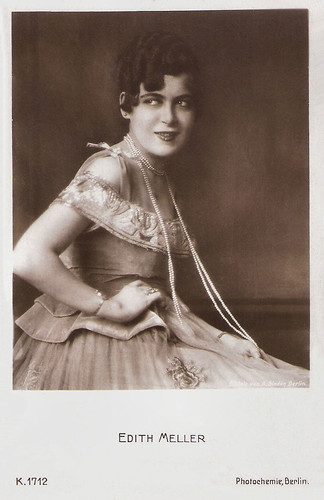
German postcard by Photochemie, Berlin, no. K. 1712. Photo: Alex Binder, Berlin.
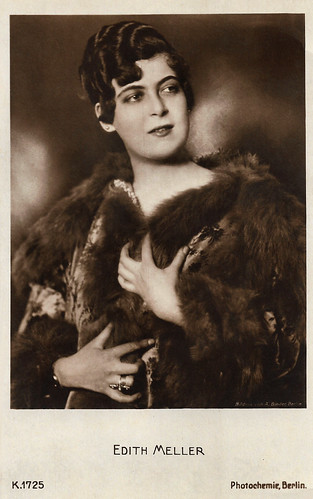
German postcard by Photochemie, Berlin, no. K. 1725. Photo: Alex Binder, Berlin.
In 1921 Edith Meller played the character of Conchita in the serial Der Mann ohne Nahmen/Peter Voss, Thief of Millions (Georg Jacoby, 1921), starring Harry Liedtke as master-thief and globetrotter Peter Voss. The six-part serial, based on the novel 'Peter Voss, Thief of Millions' by Ewald Gerhard Seeliger, was shot at the Tempelhof Studios with extensive location filming taking place in Denmark, Holland, Italy, Spain, Morocco, and Dalmatia.
She also appeared in Ernst Lubitsch's classic farce Die Bergkatze/The Wild Cat (1921), starring Pola Negri.
Eventually, Meller married Georg Jacoby in 1922. Meller mostly played supporting parts in the 1920s, such as in Das Paradies im Schnee/Paradise in the Snow (Georg Jacoby, 1923) with Bruno Kastner and Elga Brink in her film debut. The 18-year-old Brink became the new love of Jacoby.
Jacoby and Meller divorced and her career soon stagnated. Her last parts, such as in the drama Meineid/Perjury (Georg Jacoby, 1929) with Alice Roberts, Franz Lederer, and Miles Mander, were minor ones.
She couldn't act during the Third Reich. According to the Reichsfilmkammer documents, she was considered a so-called fully Jewish woman. In 1936 Edith Meller became the mother of a daughter named Edith in Berlin.
According to Wikipedia, when the deportations of Jews in Germany were in full swing, Jacoby and his then-wife Marika Rökk offered Meller refuge in their villa at the Schwarzwald. The couple had bought this from the film producer Alfred Zeisler, who had emigrated to America.
However, according to Filmportal.de, she also had a small part in the American film Passage to Marseille (Michael Curtiz, 1944), starring Humphrey Bogart. This indicates she must have been able to flee to the USA. According to Stephanie D'heil at Steffi-line, Meller could not gain a foothold in Hollywood and she returned to Germany after the Second World War.
Edith Meller passed away in Berlin in 1953. She was only 56.
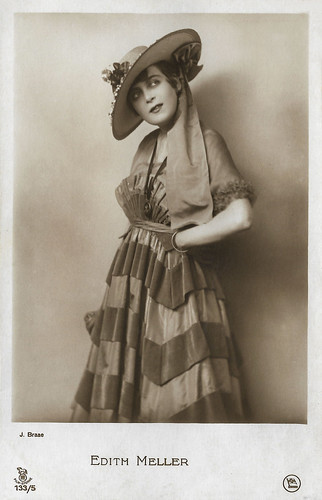
German postcard by Rotophot in the Film Sterne series, no. 133/5. Photo: J. Braae.
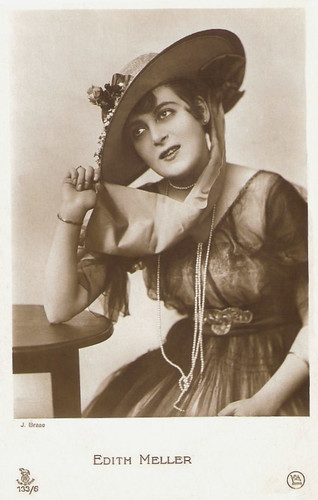
German postcard by Rotophot in the Film Sterne series, no. 133/6. Photo: J. Braae.
Sources: Stephanie D'heil (Steffi-line - German), Filmportal.de, Wikipedia (German), and IMDb.

German postcard by Rotophot in the Film Sterne series, no. 133/2. Photo: J. Braae.

German postcard by Rotophot in the Film Sterne series, no. 133/3. Photo: J. Braae.
Debut in a pro-Bulgaria propaganda film
Edith Meller (also Mèller) was born in 1897 in Budapest, then one of the two capitals of the dual monarchy Austria-Hungary. She was the daughter of a mill owner and spent her childhood and youth in Pressbaum near Vienna.
She attended a Viennese theatre school and received her first engagement at the Theater an der Wien.
On the mediation of former Austro-Hungarian Foreign Minister Leopold Berchtold's wife, Meller could make her film debut in the pro-Bulgaria propaganda film Bogdan Stimoff (Georg Jacoby, 1916), a German-Austrian-Hungarian coproduction by the Projektions-AG Union (PAGU) Berlin and the Austro-Hungarian cinema industry in Vienna. For this film, made in the middle of the First World War, she called herself Edith Möller.
Then she appeared in Benjamin, der Schüchterne/Benjamin, the shy one (William Karfiol, 1916) with Wilhelm Diegelmann.
It was followed by roles in such propaganda films as Die Entdeckung Deutschlands/The Discovery of Germany (Georg Jacoby, Richard O. Frankfurter, 1916) and Der feldgraue Groschen/The field-gray penny (Georg Jacoby, 1917). These films were issued to help raise funds in Germany during the First World war.
Then followed roles at National Film in films by Georg Victor Mendel and Georg Jacoby, such as Der Antiquar von Straßburg/The Strasbourg antiquarian (Georg Victor Mendel, 1917) with Ludwig Hartau, and the adventure film Indische Rache/Indian revenge (Leo Lasko, Georg Jacoby, 1920) with Harry Liedtke.

German postcard by Photochemie, Berlin, no. K. 1712. Photo: Alex Binder, Berlin.

German postcard by Photochemie, Berlin, no. K. 1725. Photo: Alex Binder, Berlin.
A classic farce by Lubitsch
In 1921 Edith Meller played the character of Conchita in the serial Der Mann ohne Nahmen/Peter Voss, Thief of Millions (Georg Jacoby, 1921), starring Harry Liedtke as master-thief and globetrotter Peter Voss. The six-part serial, based on the novel 'Peter Voss, Thief of Millions' by Ewald Gerhard Seeliger, was shot at the Tempelhof Studios with extensive location filming taking place in Denmark, Holland, Italy, Spain, Morocco, and Dalmatia.
She also appeared in Ernst Lubitsch's classic farce Die Bergkatze/The Wild Cat (1921), starring Pola Negri.
Eventually, Meller married Georg Jacoby in 1922. Meller mostly played supporting parts in the 1920s, such as in Das Paradies im Schnee/Paradise in the Snow (Georg Jacoby, 1923) with Bruno Kastner and Elga Brink in her film debut. The 18-year-old Brink became the new love of Jacoby.
Jacoby and Meller divorced and her career soon stagnated. Her last parts, such as in the drama Meineid/Perjury (Georg Jacoby, 1929) with Alice Roberts, Franz Lederer, and Miles Mander, were minor ones.
She couldn't act during the Third Reich. According to the Reichsfilmkammer documents, she was considered a so-called fully Jewish woman. In 1936 Edith Meller became the mother of a daughter named Edith in Berlin.
According to Wikipedia, when the deportations of Jews in Germany were in full swing, Jacoby and his then-wife Marika Rökk offered Meller refuge in their villa at the Schwarzwald. The couple had bought this from the film producer Alfred Zeisler, who had emigrated to America.
However, according to Filmportal.de, she also had a small part in the American film Passage to Marseille (Michael Curtiz, 1944), starring Humphrey Bogart. This indicates she must have been able to flee to the USA. According to Stephanie D'heil at Steffi-line, Meller could not gain a foothold in Hollywood and she returned to Germany after the Second World War.
Edith Meller passed away in Berlin in 1953. She was only 56.

German postcard by Rotophot in the Film Sterne series, no. 133/5. Photo: J. Braae.

German postcard by Rotophot in the Film Sterne series, no. 133/6. Photo: J. Braae.
Sources: Stephanie D'heil (Steffi-line - German), Filmportal.de, Wikipedia (German), and IMDb.
No comments:
Post a Comment